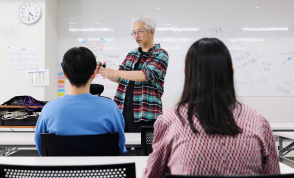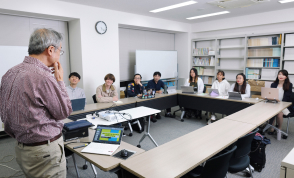Aiming for Original Linguistic
Research from an International Perspective
The Department of Linguistics of the Graduate School of Linguistic Sciences is characterized by its diverse curriculum, which includes major areas of general linguistics and applied linguistics based on them, subject groups in individual foreign language studies (English, German, French, Ispania, Russian, Portuguese, and Japanese), and speech and hearing impairment studies.
In the Master’s Course, students learn the basic concepts and methods of linguistics, and acquire research methods and thesis writing skills through the preparation of a master’s thesis on a specific area of study. In the Doctoral Program, students will further deepen their knowledge of linguistics and linguistics-related fields developed in the Master’s Program and, from a broader perspective, cultivate researchers who can contribute both domestically and internationally in the fields of theoretical and applied research on language.

-
Scientific Study of LanguagetAt the Graduate School of Languages and Linguistics, we believe that the study of each student’s major language (English, German, French, Hispanic, Russian, Portuguese, and Japanese) and the study of general linguistic theory are inseparably related. Through scientific research on language based on this common theory, we aim to explore the diversity of each individual language and, at the same time, the universal essence of humanity that lies at its root.
-
Multi-faceted Approaches to Language ResearchtWhile our approach to language research is based on general linguistic theory, we have also enhanced the research aspects of applied linguistics related to general linguistic theory, such as research on speech-language pathology and language education. As a result, many graduates of the Graduate School of Languages and Linguistics are active in hospitals, schools, and research institutes as speech-language pathologists, Japanese language teachers, and English language education specialists.
-
Small-group Education and Extensive Thesis GuidancetEducation and research are conducted based on the philosophy of cultivating students who can establish their own areas of specialization from a wide range of fields in linguistics and contribute to society by making the most of their expertise. The Master’s Program has 33 students per year, the Doctoral Program hosts 5 students per year, and there are 28 full-time faculty members, making for a small-group education system. This enables students to receive extensive guidance on their thesis.
-

Japanese Only
General LinguisticsGeneral Linguistics aims to explore the essence of human nature based on a multifaceted approach to language study. Based on the knowledge of each student’s major language, students learn the basic concepts and methods of linguistics, prepare a master’s thesis on a specific area of study, and learn research methods and how to compile a thesis.read more -

Japanese Only
Speech-Language and
Hearing Research CourseThis course aims to train clinicians and researchers who can provide professional support to such children and adults with speech and communication disorders. While studying in the Master’s Course, students can obtain eligibility to sit for the National Examination for Speech-Language Pathologists by taking courses designated by the Ministry of Health, Labor and Welfare.read more -

TESOL (Teaching English to Speakers of Other Languages) Course
The Teaching English as a Second Language (TESOL) course aims to train teachers of English with a high level of expertise in practical skills backed by theory. While critically examining empirical research on foreign language acquisition and education in Japan and abroad, students will develop the best teaching methods for their own learners, verify their effectiveness, and develop the ability to communicate their findings to teachers and researchers in Japan and abroad.read more -

Japanese Only
Japanese Language Education CourseThis course is designed to train Japanese language teachers with both professional and practical skills. The course is characterized by its ability to study Japanese language pedagogy with an eye toward international students from diverse backgrounds and to have hands-on experience in the field. In addition to attending lectures, students can develop practical skills by becoming teaching assistants and tutors for international students studying Japanese on campus.read more













